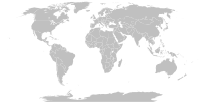| Overview | |
|---|---|
| Games of the XXXI Olympiad XV Paralympic Games | |
| Winner: Rio de Janeiro Runner-up: Madrid Shortlist: Tokyo · Chicago | |
| Details | |
| Committee | IOC |
| Election venue | Copenhagen 121st IOC Session |
| Map of the bidding cities | |
| Important dates | |
| First Bid | September 13, 2007 |
| Second bid | January 14, 2008 |
| Shortlist | June 4, 2008 |
| Decision | October 2, 2009 |
| Decision | |
| Winner | Rio de Janeiro (66 votes) |
| Runner-up | Madrid (32 votes) |
| Part of a series on |
| 2016 Summer Olympics |
|---|
| Part of a series on |
| 2016 Summer Paralympics |
|---|
|
Seven cities submitted bids for 2016 Summer Olympics and Paralympics on September 13, 2007, aiming to host the Games of the XXXI Olympiad.[1] All of them were recognized by the International Olympic Committee (IOC) on September 14, 2007, becoming Applicant cities.[2] Although several cities submitted to be in consideration to host the 2016 Olympics, including New York City and Los Angeles, on June 4, 2008, the IOC Executive Board shortlisted the four strongest bids to become Candidate cities. Those cities were Chicago, Madrid, Rio de Janeiro and Tokyo; the decisions were made during a meeting in Athens, Greece.[3][4] The remaining Applicant cities—Baku, Doha and Prague—were eliminated.[5]
The four Candidate cities were selected according to a detailed study of the Applicant Files received by the IOC Working Group on January 14, 2008.[6] The four cities submitted the Candidature Files to the IOC on February 11, 2009.[7] They were analyzed by the IOC Evaluation Commission, which made site inspections in Chicago (April 4–7, 2009), Tokyo (April 16–19, 2009), Rio de Janeiro (April 27–May 2, 2009) and Madrid (May 5–8, 2009).[8] Under the leadership of Nawal El Moutawakel, the Evaluation Commission released its report on September 2, 2009; one month prior to the election.[9][10]
With the presence of the heads of state from all four Candidate cities, the 121st IOC Session took place in Copenhagen, Denmark, on October 2, 2009.[11] Chicago began the presentations at Bella Center; followed by Tokyo, Rio de Janeiro and Madrid; which were attended by several celebrities such as the King of Spain, Oprah Winfrey and Pelé.[12][13] Before the vote, the IOC Evaluation Commission presented its report to the Session.[12] Chicago fell in the first round, followed by Tokyo, after the eligible IOC members have been asked to vote, in a three-round exhaustive ballot process.[14][15]
Rio de Janeiro defeated Madrid in the final round by 66 votes over 32, winning the rights to host the 2016 Summer Olympics and Paralympics.[16][17] Brazil would become the first lusophone country and Rio de Janeiro the first city in South America to host the Summer Olympics.[18] The announcement was made by Jacques Rogge, president of the IOC, in a widely broadcast ceremony.[19] The lengthy and intensive bidding process, considered to be one of the tightest in history, was marked by several controversies such as espionage, racism and opposition movements.[20]
Out of the six cities that failed to be awarded the 2016 Olympics, four of them bid for the 2020 Summer Olympics. Baku, Doha, Madrid and Tokyo were official Applicant Cities, with Madrid and Tokyo advancing to become Candidate Cities and with Tokyo eventually being selected.
- ^ "Seven Applicant NOCs/Cities for the 2016 Games". International Olympic Committee. September 14, 2007. Retrieved March 2, 2010.
- ^ "7 Applicant NOCs/Cities for the 2016 Olympic Games". International Olympic Committee. September 14, 2007. Retrieved March 2, 2010.
- ^ "Four cities to compete to host the 2016 Olympic Games". International Olympic Committee. June 4, 2008. Retrieved March 2, 2010.
- ^ "Four on 2016 Olympics short list". BBC. June 4, 2008. Retrieved March 2, 2010.
- ^ "2016 Olympic Bid Short List Preview". GamesBids. June 3, 2008. Archived from the original on December 29, 2010. Retrieved March 2, 2010.
- ^ "All seven 2016 Applicant Cities return responses". International Olympic Committee. January 14, 2008. Retrieved March 2, 2010.
- ^ "Candidature Procedure 2016 – All four candidate cities submit their files to the IOC". International Olympic Committee. February 12, 2009. Retrieved March 2, 2010.
- ^ "2016 Evaluation Commission: Dates of visits to Candidate Cities". International Olympic Committee. October 23, 2008. Retrieved March 2, 2010.
- ^ "IOC Releases 2016 Olympic Report". Around the Rings. September 2, 2009. Archived from the original on February 24, 2012. Retrieved March 2, 2010.
- ^ "IOC announces composition of 2016 Evaluation Commission". International Olympic Committee. September 18, 2008. Retrieved March 2, 2010.
- ^ "Rio to stage 2016 Olympic Games". BBC. October 2, 2009. Retrieved March 2, 2010.
- ^ a b "The 2016 Bid Process Explained". International Olympic Committee. October 2, 2009. Retrieved March 2, 2010.
- ^ "Obama 2016 In Copenhagen - What Bid?". GamesBids. October 1, 2009. Retrieved March 2, 2010.
- ^ "The Olympic Bid Vote – Ballot By Ballot Results". GamesBids. October 2, 2009. Retrieved March 2, 2010.
- ^ "Olympic Host City Selection Voting Procedures". GamesBids. October 1, 2009. Retrieved March 2, 2010.
- ^ "Rio de Janeiro Elected As 2016 Host City". International Olympic Committee. October 2, 2009. Retrieved March 2, 2010.
- ^ "Olympics affirms Brazil's rise, Lula's legacy". Reuters. October 2, 2009. Archived from the original on 15 January 2010. Retrieved March 2, 2010.
- ^ Macur, Juliet (October 2, 2009). "Rio Wins 2016 Olympics in a First for South America". The New York Times. Retrieved March 2, 2010.
- ^ "Rio de Janeiro to host 2016 Olympics". CNN. October 2, 2009. Archived from the original on 28 January 2010. Retrieved March 2, 2010.
- ^ "2016 Olympic Bid Timeline – How We Got Here". GamesBids. October 1, 2009. Retrieved March 2, 2010.
